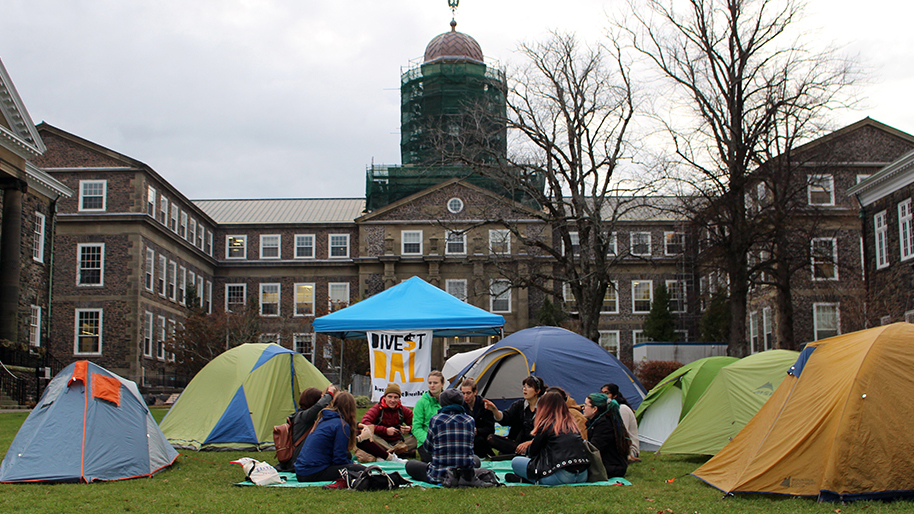Protest
‘We’re not going away’: Divest Dal camps out for climate change
Student group wants Dalhousie University to stop investing in fossil fuels

caption

caption
Divest Dal members inside one of their tents Wednesday night.On an unseasonably warm and rainy Wednesday night, Dalhousie University students circled a lantern inside a tent in the campus quad to make a statement about climate change.
Earlier that morning, members of Divest Dal set up six tents in front of the Henry Hicks Building. They plan to spend nights under rain flys and in sleeping bags to protest the university’s investments in fossil fuel companies.
“Some nights will be rainy; some nights will be cold, but we are prepared for that and, you know, that’s just part of showing that we really care about this and this really matters,” said Laura Cutmore, a master’s student in the library and information studies program taking part in the demonstration.
The group is calling on the Board of Governors to stop investing the university’s endowment fund in fossil fuel companies. The board is scheduled to meet at Dalhousie next week, but a discussion of divestment is not listed on the agenda. Related stories
Alex Ayton, a member of Divest Dal, said the group wants Dalhousie to follow institutions like Université Laval and the Atlantic School of Theology, which have divested. Ayton said the university has not responded to the group’s request for another divestment report and public discussions with students.
“We’re not going away,” she said.
In 2014, the Board of Governors investment committee met with Divest Dal. In its final report, the investment committee found that “fossil fuel divestment will not be an effective method to impact climate change.”
The report stated “divestment is not expected to influence the operations of major fossil fuel companies,” and the university should instead focus on engaging with these companies to create lasting change. It also pointed out Dalhousie’s $45-million investment in initiatives aimed at reducing the university’s carbon footprint.

caption
Divest Dal members gather in the quad Wednesday afternoon.Cutmore said the act of divesting is more than just a symbolic gesture.
“The point of divestment isn’t necessarily to bankrupt the fossil fuel industry, it’s to bankrupt their social licence, which means taking away the implied consent that they have to continue to do what they’re doing,” she said.
According to Fossil Free, a project of the environmental organization 350.org, more than 800 institutions and more than 58,000 individuals around the world have divested. This total surpasses $5 trillion.
“It is more possible and more profitable than ever, and more necessary than ever, to divest,” Cutmore said.
Cutmore does not know how long the group will continue to camp out in the quad. Organizers say Divest Dal notified Dalhousie’s administration of the camp-out, but did not get permission to hold the event. Members have also planned programs over the next few days, including a vigil and potluck meal.
Ayton said Divest Dal sent the Dalhousie president, Richard Florizone, an email about the camp-out and their requests, but have not received an official response. Members said the president wanted to deliver pizza to them Wednesday afternoon, but they rejected the offer.
“That’s not what this is about,” said Ayton. “We’re not going to stop campaigning for (divestment) and we’re not going to stop being loud, very similar to the fact that climate change isn’t going to just stop impacting people and impacting our planet.”
The president’s office couldn’t be reached for comment by Thursday afternoon.

